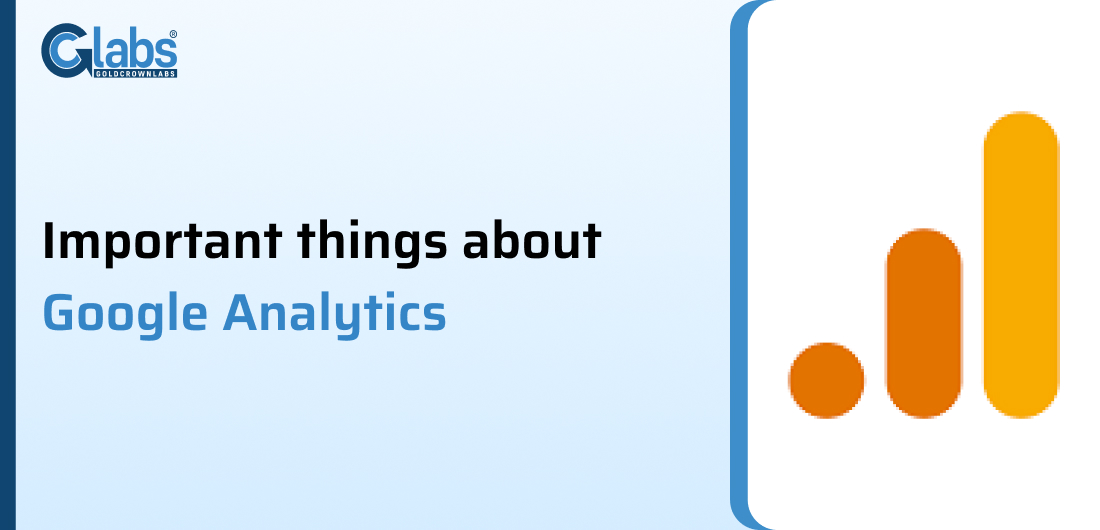What is its purpose?
Google Analytics collects a lot of information about your website and its users. These facts consist of:
1. How visitors get to your website
2. How visitors respond to the material on your website
3. The characteristics of the visitors to your website
4. How many visits to your website convert, and much more
The reports in Google Analytics may be used to carry out tasks like:
1. Assessing the success of your marketing initiatives
2. Assessing the effectiveness of your pages and learning how to improve them
3. Choosing the audience for your marketing and content
4. Monitoring sales and conversions.
What are its promising features ?
1. Google Analytics is used to measure website usage statistics including session length, pages per session, and bounce rates, as well as details about the traffic source.
2. It may be linked with Google Ads, allowing users to build and assess online campaigns by monitoring the effectiveness of landing pages and conversion rates (goals).
3. Sales, lead generation, accessing a certain page, or downloading a specific file are a few examples of goals.
4. With tools like funnel visualization, where users originated from, how long they spent on the website, and their location, Web Analytics analysis helps find sites that aren’t doing well.
5. Additionally, it offers more sophisticated features, such personalized visitor segmentation.
6. Sales activity and performance may be monitored using Google Analytics’ e-commerce reporting. The e-commerce reports display a site’s income, transactions, and many other indicators connected to commerce.
The most recent version of Google Analytics, known as GA4, has new features that centre on privacy, customizability, and predictions. These qualities include, among others:
- A novel idea that would enable the same property to be utilised for both mobile apps and websites
- Machine learning-based prediction metrics enabled by AI
- Personalized and simple to use homepage
- A component called Explore will offer fully customised reports for certain company requirements.
- A built-in DebugView to immediately examine and debug the incoming data
- Analyzing anomalies
- Enhanced reports on e-commerce.
- A novel idea that would enable the same property to be utilised for both mobile apps and websites
- Machine learning-based prediction metrics enabled by AI
- Personalized and simple to use homepage
- A component called Explore will offer fully customised reports for certain company requirements.
- A built-in DebugView to immediately examine and debug the incoming data
- Analyzing anomalies
- Enhanced reports on e-commerce.
For whom Google Analytics is useful?
How does Google Analytics function?
Evaluation of a website
You must first register for a Google Analytic account in order to measure a website.
Then, each page of your website has to have a short bit of JavaScript measuring code added to it.
The tracking code will gather anonymous data each time a person accesses a website regarding their interactions with the page.
The measuring code for the Google Store might reveal the number of individuals who visited a page selling drinkware as opposed to a page selling houseware. Or, by monitoring whether visitors reached the purchase-confirmation page, it may provide the number of people who purchased an item, such as an Android doll.
The measurement code will also gather data from the browser, such as the language preference, the type of browser being used (such as Chrome or Safari), as well as the hardware and operating system. It can also track the “traffic source,” or the thing that originally led viewers to the website. They may have clicked on an advertising, a search engine, or an email marketing campaign.
Collecting and handling
Is there any limitation of Google Analytics?
- Only a portion of your traffic is examined and utilized to estimate the total results because Web Analytics samples your data.
- You are not given access to raw data by Google Analytics. It only provides you with aggregated data that is presented in a condensed format, so your reports might be missing important specifics. It’s also more difficult to conduct complex analyses.
- You must be informed of regional data privacy rules if your business handles personal data and conducts business internationally. Laws of the nations where data is gathered and stored are included in this. Additionally, maintaining data internally could be mandated by company policies or industry standards.
- The privacy of users was not considered when designing Google Analytics. It succeeds in some areas, such as data security, but fails in others, primarily transparency and giving people control over their own data. You must therefore handle data protection on your own.
- It takes a lot of time and effort to set up and manage your website’s statistics. Google Analytics solely offers online documentation and discussion boards as help. Despite the fact that there are many forums focused on the platform’s problems because to its large user base. You’ll still need to go through the information to determine what is current and what is out-of-date, irrelevant, or unrelated.
An introduction to google analytics 4(GA4)
- Gathers information from apps and websites to better understand the client experience.
- Instead of session-based data, it uses event-based data
- Includes privacy protections including cookieless measurement, behavioral modelling, and conversion optimization
- Without using complicated models, predictive capabilities provide direction.
- Direct connections with media platforms aid in generating activity on your app or website.
How to study and understand Google Analytics the best manner possible?
Here are some organized and practical tips to help you become an authority in Google Analytics.
Training Programs at Google
Each of Google’s measurement tools is covered in free online training courses offered by the Google Analytics Academy. If you want to become an expert in Google Analytics, don’t miss the courses listed below.
For Beginners using Google Analytics
One of the most frequent errors individuals make while studying Google Analytics is to skip the basics and jump right into advanced training. If you want to study Google Analytics from scratch, the Google Analytics for Beginners course is the ideal choice.
You will learn how to use Google Analytics’ reports and user interface, build dashboards, assess audience and behavior data, and more in this course.
Google Analytics advanced
Power Users' Guide to Google Analytics
Introduction to Google Analytics 360
Google Analytics 360 gives businesses the resources and support they need to transform data into useful insights. Planning, purchasing, measuring, and optimizing digital advertising and customer experiences are made easier for marketers by Google Analytics 360. To gather information, we use tools like BigQuery, Google Marketing Platform products, and Google Ad Manager.
Conclusion
The most popular website statistics tool is Google Analytics. According to a survey published by Pingdom in May 2008, and was used by 161 of the 500 largest websites in the world (or 32% of them), as measured by Alexa rank.
Later market share research indicated that around 49.5% of the top 1,000,000 websites used Google Analytics (as ranked in 2010 by Alexa Internet). It was used by over 55% of the top 10,000 websites in 2012.
And according to BuiltWith, as of April 2022, 73.7% of the 10,000 most popular websites were using Google Analytics.
If you need assistance maximizing the value of your web analytics, reach out to goldcrownlabs.



